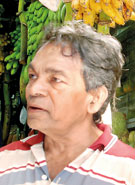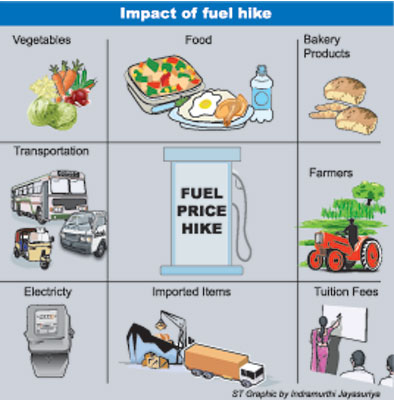News
Two fuel hikes in two months: too much to take
View(s):The chorus of protests over the rising cost of living, made worse by the recent increase in petrol and diesel prices, gets louder by the day. Nadia Fazlulhaq and Skandha Gunasekara report
Increases in the prices of several goods and services have become imperative – the result of last Saturday’s fuel price hike. The Ceylon Petroleum Corporation raised the price per litre of petrol (octane 90 and 95); super diesel by Rs. 3; auto diesel by Rs. 6 and industrial kerosene by Rs. 4. Octane-90 petrol now costs Rs.162 per litre; octane-95 petrol Rs. 170; auto diesel Rs. 121, and super diesel Rs.145.
It was only in December last year that the CPC raised the price of a litre of 90 octane petrol by Rs. 10, charging Rs.159 per litre. In January, fuel distributors Litro Gas Company and Laugfs both raised the price of a 12.5 kg gas cylinder by Rs. 150, charging Rs. 2,396 a gas cylinder.The Sunday Times interviewed a cross-section of the public, from farmers to doctors and from economic experts to housewives. Among the worst affected by the price increase is the transport sector. Private transport companies are already talking about island-wide strikes.

Lionel Wipulasena: A fruit seller for over four decades says times are hard. Pix by M.D. Nissanka
Three-wheeler drivers who kept to their old rates after the December price hike say they have no choice but to raise charges with the latest price increase. “We have increased our charge for the first kilometre by Rs. 10 and now a kilometer costs Rs. 60,” said Lalith Dharmasekare of the All Island Three Wheeler Drivers Union. “Some independent drivers are charging even more. You cannot blame them. We are all being slowly crushed by the cost of living, which never seems to come down but only goes up.”
The Private Bus Owners Association is mulling whether to increase their rates. Chairman Gemunu Wijeratne said that if the Government did not give a fuel subsidy, the union would launch an island-wide strike. “Whenever we raise our rates, our customers object. Raising bus fares does not work. We hope the Government will heed our request. Otherwise we may have to resort to trade union action and call for an all-island strike,” he said.
Malsiri de Silva, who is president of the All Island Schoolchildren Transport Association, told the newspaper that they are charging Rs. 100 more per student travelling within Colombo. Students commuting long distances outside Colombo may be charged an extra Rs. 200.The diesel price increase has had a wide impact on both commuters and consumers.
“Just about everything has gone up in price, from a plain lunch packet to daily bus fares,” says private sector employee Wimal Kuruwita. “This is hitting every middle-class and working class family.” Lionel Wipulasena has sold fresh fruit for a living for the past four decades. He feels the pinch as consumers are buying less fruit, which are now being considered an extra expense, even a luxury. “Every week I have to throw away large quantities of fruit,” the vendor told the newspaper. “People are not buying and the fruit start rotting. Higher transport costs are hitting the small trader badly.”
The poor labourer can barely afford a single Rs. 100 meal a day of two buns and a glass of plain tea, said eatery owner M. Fernando.Janaka Kannangara operates an office transport service from Matugama to Colombo. “I can take 30 office workers in my van. They each pay me Rs. 5,800 a month. I may be forced to raise the charge by Rs. 200 or Rs. 300, but if I do that I may lose customers. They say their salaries have not changed and they can barely manage their daily expenses.”

Janaka Kannangara | I can take 30 office workers in my van. They each pay me Rs. 5,800 a month. I may be forced to raise the charge by Rs. 200 or Rs. 300, but if I do that I may lose customers. They say their salaries have not changed and they can barely manage their daily expenses.”
Thusitha Wickremasinghe is 29 years old, works in the private sector, and was recently married. He and his wife, who also goes to work, can barely cover the house rent, utility bills, transport and food expenses with their combined salaries. Priyantha Wijeratne has been working in the finance sector for the past 15 years. He used his savings to send his two children overseas for higher studies. “I have nothing left in the way of savings. I don’t know how parents are managing now to save for their children.”
Dhammika Munasinghe is president of the Unemployed Graduates Union. He says thousands of young school leavers with GCE Ordinary Level and Advanced Level qualifications and hundreds of graduates are languishing without jobs. Many of these unemployed young people are going overseas out of desperation.
“It is too bad that our youngsters, who should be dedicating their talents for the betterment of our country, are instead going abroad to help other countries, like South Korea, Italy and the Middle East,” Mr. Munasinghe said.
Meanwhile, there is talk of a 26 per cent increase in electricity charges. According to Ceylon Electricity Board (CEB) trade union president Ranjan Jayalal, the Board is incurring heavy losses due to wastage and corruption. “We supplied large quantities of electricity for a number of state events held in Colombo. A lot of state institutions have not paid their bills. It would be unfair to pass on these unpaid sums to the general public by increasing their domestic consumption electricity bills,” he said.
Expect a loaf of bread and pastries to cost more very soon. Most bakeries use diesel to operate ovens.“We won’t be raising prices immediately, but we are holding a meeting to talk about revising bakery item prices,” said Bakery Owners Association vice-president Bandula Perera. The person who feels the cost of living from every angle is the housewife.
It is the housewife who most of the time overseas household expenditure, says Housewives Association’s secretary Deanne Rizvi. “School van charges, utility bills, food – all these are costing more. The woman in the house is the person who manages the household expenses.”
Not everyone agrees that the recent fuel price hikes are linked to international fuel price trends.“Resource mismanagement at the local level and inefficiencies in the Ceylon Petrol Corporation have led to the rise in fuel prices here, despite a drop in international prices,” said Athula Ranasinghe, who heads the Department of Economics at the University of Colombo.
“The Electricity Board has borrowed fuel on loans and has not been able to repay those debts. The Petroleum Corporation will therefore have to increase prices to cover its losses. But this is not the way to do it. The burden should not fall on the public. Those hit hardest are the masses who belong to the middle and lower-middle class.”

Follow @timesonlinelk
comments powered by Disqus


















